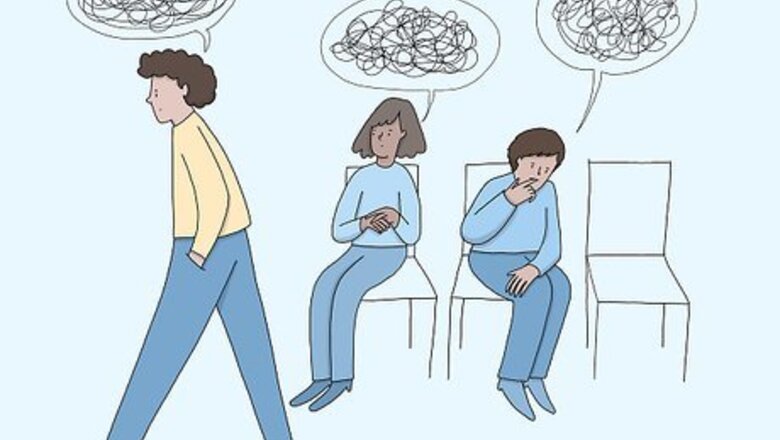
views
Being Supportive
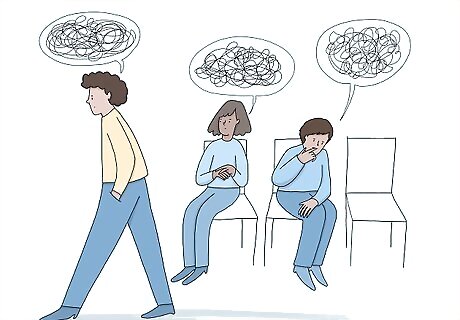
Recognize that nerves might look different in different people. In order to support someone who's nervous, you have to first be able to recognize that they're feeling that way. However, everyone reacts differently to being anxious. Some people might become isolated, procrastinate, or avoid the thing they're nervous about, while others might become irritable or nitpicky. If you know the person well, it might seem obvious to you when they're feeling nervous. However, when you're just getting to know someone, you might look for tells like fidgeting, nail-biting, or pacing.

Treat the person with compassion. Don't put the person down or make them feel bad about the fact that they're nervous—that will just make them feel worse. Keep in mind that most people feel anxious at some point or another, and try to treat the person with patience and understanding. For instance, don't say, "Calm down, you're being ridiculous!" Instead, you might say something like, "The first day at a new school can be scary, but I know you're going to do awesome."
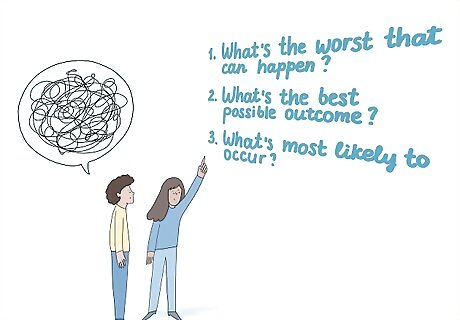
Don't dismiss what they're anxious about. Trying to downplay what the person is facing can make them feel isolated and may even make them nervous. Make an effort to acknowledge that the person's emotions are valid, even if you wouldn't feel nervous in the same situation. For instance, you might seem unsympathetic if you say something like, "Making a speech is no big deal, I do it all the time." Instead, you might say, "Getting ready for your first speech can be really hard. I'd be happy to help you rehearse if you'd like." Try this cognitive therapy technique: Try asking the person 3 questions—"What's the worst that can happen?" "What's the best possible outcome?" and "What's most likely to occur?" That allows them to explore possible outcomes without denying their anxiety.
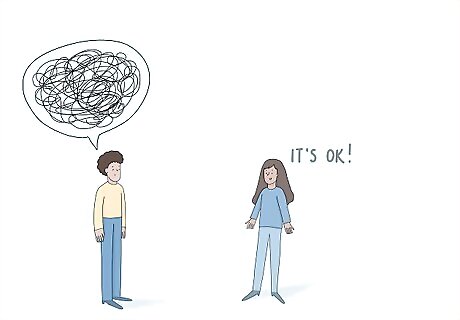
Remind the person that nerves aren't always bad. Help the person remember that being nervous is a sign that you're doing something that matters to you. That's an indication that they're on a path that can help them reach their goals, so in that regard, being nervous is actually a good thing! For example, you might say, "Being nervous doesn't mean you can't do it! Even world-class athletes still get nervous before a big game."

Distract the person by doing something enjoyable. Sometimes the best way to overcome nerves is just to take your mind off of that. To help someone else stop being nervous, encourage them to go with you to do something that will occupy their body and mind, like going for a walk, cooking a meal together, or watching a movie. Sometimes, just telling the person a story about your day will be enough to take their mind off of their nerves, at least for a little while. Reader Poll: We asked 413 wikiHow readers to tell us what they would do to help someone in their life relax, and 59% agreed that taking them for a walk is the best thing you can do to reduce their stress. [Take Poll]
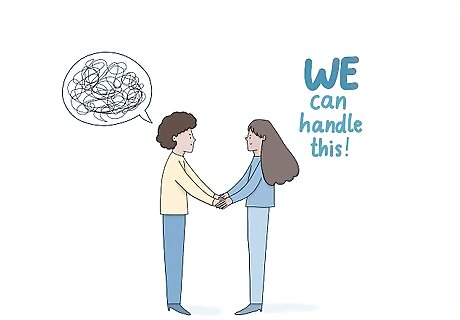
Reassure the person that you're there for them. When you're talking to the person who's nervous, try to use "we" statements, and let them know you'll be there to help however you can. As you assure the person that they're part of a team, they may start to feel like their problems are more manageable, which might help them be more calm overall. For instance, if you're talking to someone who's nervous about getting on a plane for the first time, you might say things like "Hey, we can handle this! Do you want me to drive you to the airport?" and "You can use the plane's Wi-Fi to message me through the whole flight, if you want."

Practice mindfulness exercises with the person if they're feeling panicked. Sometimes being nervous can turn into full-blown anxiety. If that happens, try to help the person come back to the present by doing deep breathing exercises. You can also help the person notice the physical world around them. For instance, you might help them feel grounded by lightly placing your hand on their arm, shoulder, or back. If you're close, you might offer them a hug, as well. If you don't know the person well or they're not comfortable being touched, you might ask them to name 5 things they can see, 4 things they can touch, 3 things they can hear, 2 things they can smell, and 1 thing they can taste. Focusing on their senses can help lessen their overwhelming feeling of panic. EXPERT TIP Adam Dorsay, PsyD Adam Dorsay, PsyD Licensed Psychologist & TEDx Speaker Dr. Adam Dorsay is a licensed psychologist in private practice in San Jose, CA, and the co-creator of Project Reciprocity, an international program at Facebook's Headquarters, and a consultant with Digital Ocean’s Safety Team. He specializes in assisting high-achieving adults with relationship issues, stress reduction, anxiety, and attaining more happiness in their lives. In 2016 he gave a well-watched TEDx talk about men and emotions. Dr. Dorsay has a M.A. in Counseling from Santa Clara University and received his doctorate in Clinical Psychology in 2008. Adam Dorsay, PsyD Adam Dorsay, PsyD Licensed Psychologist & TEDx Speaker Encourage them to try square breathing to slow down their heart rate. Have them breathe in for 4 seconds, hold for 4 seconds, then exhale for 4 seconds.
Helping the Person Prepare
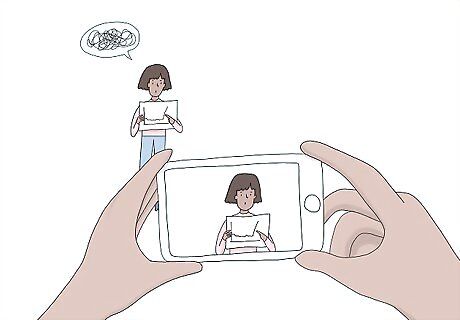
Ask the person if there's anything you can do to help them get ready. Sometimes, a person might just need a little assistance to start conquering their nerves. Try asking the person if there's anything that they can think of that would be helpful as they get ready for their big event. It may also help if you include a suggestion of a way you might help. If the person is nervous about a test, for instance, you might say something like, "How can I help you study? Would it help if we made flashcards?" If they're nervous about a presentation, offer to listen to them rehearse. You might also time their presentation, or you could even videotape it so they can see where they might need to make changes.

Help the person see the task in front of them as a series of steps. If you know someone who's nervous about something that's coming up, try asking them what they need to do in order to be ready. Then, help them make a list of small, easily manageable tasks that they can work on as they prepare. This can help them feel less overwhelmed by what's ahead. For instance, if someone is nervous about a job interview, their preparation steps might be to practice answering interview questions in the week before the interview, to lay out their clothing and get a good night's sleep the night before, and to have a good breakfast before the interview. If someone has a presentation coming up for work, their steps might be to gather the data they need, create slides or an outline, and rehearse the presentation out loud.

Allow the person to do the work themselves. It can be tempting to want to swoop in and save the day when someone else is nervous, especially if it's a close friend or family member. However, that could actually make them more nervous, since they won't feel confident in their ability to handle the problem themselves. For instance, if you have a child who's nervous about applying to college, it wouldn't be helpful to fill out their college applications or write an essay for them. However, you might offer to help them gather and organize important documents, like any letters of reference or their immunization documents.

Prepare a meal for them the night before the event if you can. When someone is nervous, sometimes it can be hard to remember to eat. However, going into a nerve-wracking situation on an empty stomach can lead them to feel shaky and weak. To help prevent that, offer to prepare a meal for the person the night before their big event. If you don't want to cook, try ordering food from a restaurant they like. If their event is later in the day, you might offer to make them breakfast that morning, instead. Tip: It can also help to encourage the person to get a full night's sleep beforehand. For instance, even if your child is feeling nervous, try to stick to their normal bedtime routine: dim the lights and turn off electronic devices an hour before bedtime, give them a warm bath right before bed, and stay with them until they fall asleep.

Encourage them to strike a power pose right before the big event. A power pose is a stance that can trick your brain into feeling more confident. Have the person stand facing you with their shoulders back, hands on their hips, and feet shoulder-width apart. Then, tell the person to try this power pose a few minutes before they walk into their presentation, test, or interview. Consider combining this with positive affirmations like "I can do this!" or "I am strong, smart, and confident."

Take care of yourself. In order to help someone else calm down, you have to be relaxed and comfortable yourself. If you start to feel overwhelmed or anxious, excuse yourself for a moment, without calling attention to how you're feeling. Then, try a deep breathing exercise or ground yourself by paying attention to the physical sensations around you. Once you feel better, you can go back to helping the other person.




















Comments
0 comment